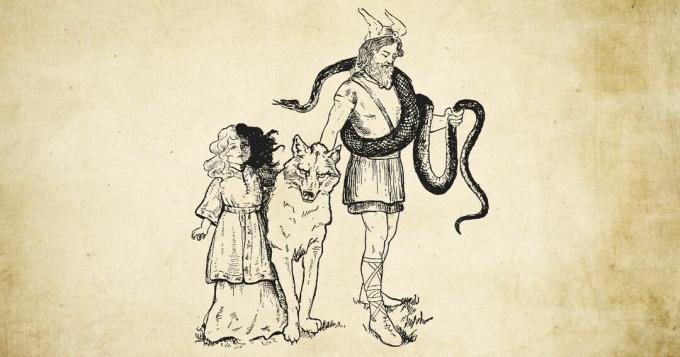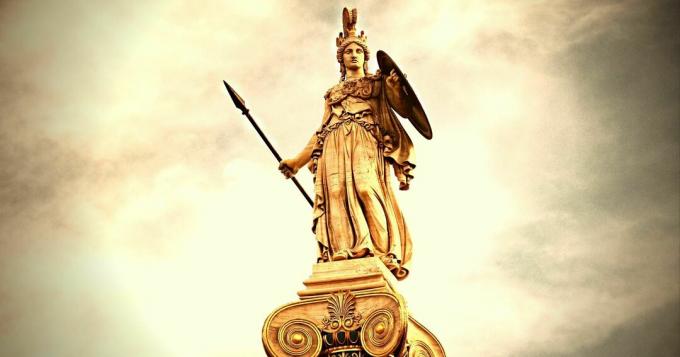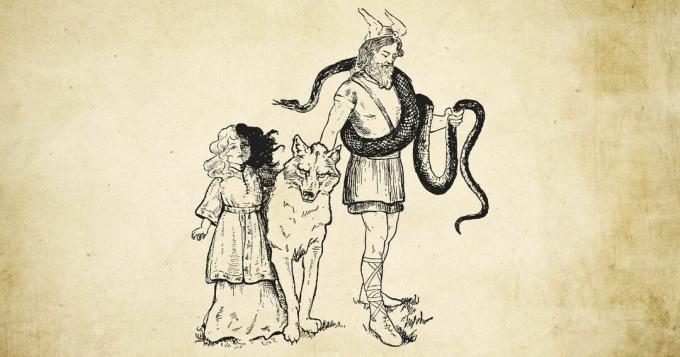Loki is the god of Norse mythology associated with cheating, mischief and magic. Complex and multifaceted figure, he is the son of the giants Laufey It is farbautibut lives in Asgard, the divine realm, in the company of the main clan of Norse gods, the aesir.
One of Loki's most defining characteristics is his ability to metamorphose. He can assume different forms and change his appearance at will, allowing him to infiltrate situations and deceive other gods and beings. This skill also reflects his unpredictable and unstable character.
The god of lies is known for his pranks and jokes, but also for his side dingy It is treacherous. It is often portrayed as a ambiguous god, which both helps and hinders the other gods. His ambiguous personality and actions often create conflict and disorder in the Nordic pantheon.
children of loki

The god of trickery is known in Norse mythology for his seductive character, having relationships with several mythical beings. was married to
Sigyn, a goddess and daughter of a giant, known for her loyalty to her husband. Loki also related to Angrboda, a giantess with whom she had her best-known children:Jormungandr
Also known as the Serpent of the World, Jormungandr is a gigantic serpent that envelops the world. She is one of the main antagonists in Norse legends and is destined to fight Thor during Ragnarok, the end of the gods.
Fenrir
A direwolf known for his ferocious and savage nature, Fenrir was imprisoned by the gods because his actions posed a threat to the balance of the world. During Ragnarok, the wolf will break free and fight the gods, causing devastation and death.
hell
Goddess of the underworld in Norse mythology, Hel is depicted as half alive and half dead, symbolizing her position as ruler of the realm of the dead.
Stories and Legends of Loki
The god of magic plays a central role in many stories and legends from Norse mythology. Below we have selected some of the best known.
Sif's haircut
The cunning god decides to play a trick on Sif, Thor's wife. Taking advantage of the moment when the goddess is sleeping, he cuts her beautiful golden hair, leaving her disfigured and ashamed.
When Thor discovers what has happened, he is furious and demands that the mischievous man correct his mistake. Otherwise he would face the wrath of the mighty god of thunder. Feeling pressured, Loki commits to finding a solution.
Laufey's son then addresses the skilled dwarves who reside deep within the earth. With his cunning and persuasive power, he convinces them to forge new magic hair for the goddess. These hairs are woven with golden threads and can be grown as if they were natural hair.
With the new magical hair in hand, Loki returns to Asgard with Sif's gift, restoring her beauty and restoring her confidence.
The Treachery of the Wall Builders
Gods and mortals lived together for a long time. However, Odin, the greatest of the gods, decided to create Asgard. When finishing the construction of the city, they realized that they had forgotten to build a wall to protect it. So, a knight offered to build the wall in exchange for the hand of the goddess Freya, responsible for the apple orchard of youth that kept the gods young. Loki agreed to the deal as long as the knight completed the task within six months.
To the god of trickery's surprise, the construction of the wall was advanced and the knight was about to finish on time. Odin was furious with the deal made and asked him to resolve the situation.
Loki watched the knight work and realized that he had the help of his horse, Svadilfari, to carry the stones. Then, he transformed himself into a white mare and distracted the horse, causing it to follow him into the forest, leaving the builder alone.
The knight was actually a giant in disguise who planned to destroy the gods. When he was left without his horse's help, he had to revert to his true form to work faster. Odin asked his son Thor to deal with the giant, and he easily defeated him with his hammer, Mjolnir.
Loki disappeared for a while, but eventually returned to Asgard with Sleipnir, an eight-legged horse known as the fastest in the world. Surprisingly, the god of lies became the horse's mother. Upon realizing that Odin fell in love with the animal, he decided to present him with his son, hoping that he would forget the problem that almost made the gods lose Freya and the apples of youth.
The Theft of Thor's Hammer
Thrym, a frost giant, stole Thor's hammer and hid it deep in his realm. The thief agrees to return the hammer only if Freya, the goddess of love and beauty, becomes his wife.
The gods are outraged by this proposal, and Thor refuses to allow the goddess to be sacrificed. However, Loki suggests an alternative solution: they would disguise the god of thunder as Freya and present her as a bride for the giant.
Thor reluctantly accepts the plan and dresses as a bride. During the wedding, the giant notices something strange when "Freya" devours massive amounts of food and drink. Loki quickly explains that she has spent so much time looking forward to marrying Thrym and that she is simply consuming with joy.
The moment comes when the giant places Thor's hammer in "Freya's" lap as a wedding gift. Odin's son, unable to contain his rage, grabs the hammer and unleashes its power, killing Thrym and all the giants present.
Balder's death
Balder was one of the most beloved gods, known for his beauty, kindness and invulnerability to almost all dangers. However, Loki discovered that the only thing capable of hurting the god was mistletoe.
Taking advantage of this information, the god of lies devised a plan to cause Balder's death. He discovered that Hod, the blind brother of Odin's son, was sad that he could not participate in the games that the gods played for fun. Loki then offered to help the blind god participate, giving him an arrow made of mistletoe.
The god of mischief guided Hod's hand so that he launched the arrow, which fatally hit Balder. This event triggered a series of events that culminated in Ragnarok, the final battle between the gods and the forces of chaos.
Bibliography:
- BELLOWS, Henry Adams. The Poetic Eddas. New York: Dover Publications, 2007.
- LINDOW, John. The Book of Norse Mythology. Petropolis: Voices, 2019.
See too:
- Mythology
- Norse mythology
- Greek mythology
- Paganism



